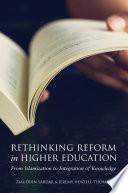
Socio-Cultural Perspectives on Science Education
An International Dialogue
Global science education is a reality at the end of the 20th century - albeit an uneven reality - because of tremendous technological and economic pressures. Unfortunately, this reality is rarely examined in the light of what interests the everyday lives of ordinary people rather than the lives of political and economic elites. The purpose of this book is to offer insightful and thought-provoking commentary on both realities. The tacit question throughout the book is `Whose interests are being served by current science education practices and policies?' The various chapters offer critical analysis from the perspectives of culture, economics, epistemology, equity, gender, language, and religion in an effort to promote a reflective science education that takes place within, rather than taking over, the important cultural lives of people. The target audience for the book includes graduate students in education, science education and education policy professors, policy and government officials involved with education.
- ISBN 13 : 9401152241
- ISBN 10 : 9789401152242
- Judul : Socio-Cultural Perspectives on Science Education
- Sub Judul : An International Dialogue
- Pengarang : W.W. Cobern,
- Kategori : Science
- Penerbit : Springer Science & Business Media
- Bahasa : en
- Tahun : 2012
- Halaman : 221
- Google Book : https://play.google.com/store/books/details?id=YntyBgAAQBAJ&source=gbs_api
-
Ketersediaan :
From this perspective Qur'an and Sunnah function not so much as source of a
critique of Western modernity (though they do that, too) as the divine source of
values and principles with which an alternative way of life, in particular, an
alternative ...









